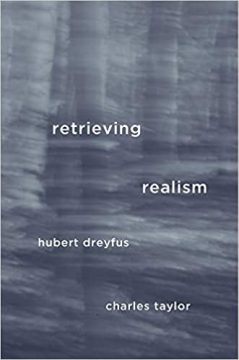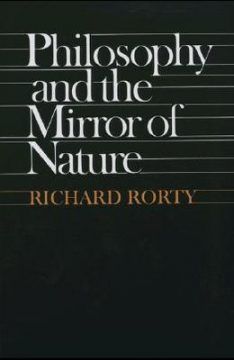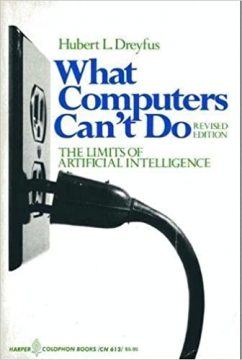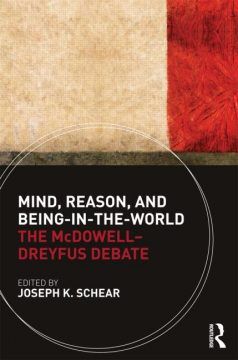by Dave Maier
 By the beginning of the 20th century, it had become clear to an influential minority of philosophers that something was badly amiss with modern philosophy. (There had been gripes of innumerable sorts since the beginning of modernity in the 17th century; but our subject today is the present.) “Modern” here means something like “Lockean and/or Cartesian,” where this means … well, it’s not immediately clear what exactly this means, nor what exactly is wrong with it, and therein lies the tale of a good deal of 20th-century philosophy. As with every broken thing, we have two choices: fix it, or throw it out and get a new one; and many philosophers have advertised their projects as doing one or the other. However, as we might expect, unclarity about the old results in corresponding unclarity about the supposedly better new. What’s the actual difference, philosophically speaking, between rehabilitation and replacement?
By the beginning of the 20th century, it had become clear to an influential minority of philosophers that something was badly amiss with modern philosophy. (There had been gripes of innumerable sorts since the beginning of modernity in the 17th century; but our subject today is the present.) “Modern” here means something like “Lockean and/or Cartesian,” where this means … well, it’s not immediately clear what exactly this means, nor what exactly is wrong with it, and therein lies the tale of a good deal of 20th-century philosophy. As with every broken thing, we have two choices: fix it, or throw it out and get a new one; and many philosophers have advertised their projects as doing one or the other. However, as we might expect, unclarity about the old results in corresponding unclarity about the supposedly better new. What’s the actual difference, philosophically speaking, between rehabilitation and replacement?
Let’s start with what two important groups of contemporary anti-modern philosophers (again, let’s leave pre-moderns out of it for today) say about what they’re doing. We can all agree that (in Wittgenstein’s words, but quoted by all and sundry) “a picture held us captive,” and even, in his continuation, that the way it did this was that “it lay in our language and language seemed to repeat it to us endlessly.” That is, it’s not simply a philosophical theory, the conclusion of an argument we have come to regard as unsound. Even in such relatively straightforward cases, of course, there may be plenty of disagreement about how to continue; but here part of our task is not simply to outline a better view, but also to diagnose and escape this characteristic feature of the old one. Such a treatment would explain how such captivity was possible, and how our very language could turn against us, as well as (naturally) what to do about it.
Our first group of jailbreakers sometimes goes by the name “post-analytic,” a name I find useful but is rarely self-ascribed. Philosophers like Donald Davidson and John McDowell attempt to prune modern empiricism of its “dogmas” while “rehabilitating” its tendentious construals of basic concepts: truth, belief, knowledge, objectivity, and so on, in the hope of retaining what we liked about it (e.g. its illumination of then-nascent modern scientific method) while avoiding the dualistic pitfalls which have suffused our language, keeping us in thrall to the outdated picture. As the generic name “post-analytic” suggests, one need not subscribe to any one overarching philosophical system in order to contribute to this project: anyone can play if they pay their way. Thus we see Hegelian pragmatists working cheek by jowl with Wittgensteinian neo-Pyrrhonians in a healthy free-for-all of (unavoidably) competing and (ideally) complementary anti-Cartesian methods, ideas, and tools. The bet is that the potential open-endedness of this process will work to its advantage rather than devolving into a Babel of conflicting strategies. (It’s early yet; time will tell.)
On the other hand, while Heideggerians and other phenomenologists have certainly made their contributions here, the more hard-core of them at least are much less pluralistic by nature, and guard their patented method rigorously. Here all the chips are on the one possibility: that the characteristic ontological move of the phenomenologist project will, after we all get used to speaking the new lingo, result in an entirely new picture, fully beyond the questionable modern empiricist turn and completely free of any lingering dogmas and myths. The aim is not to pare empiricism down and rehabilitate its basic concepts, but instead to build up from a necessary origin in pre-conceptual “engaged coping” whatever new conceptual resources we may need. Without any remaining conceptual link to empiricism for the outdated picture to exploit in “repeating itself to us endlessly,” we may finally hope for escape.
So construed, the difference gives no hint as to which strategy will be successful, if either (or both). Maybe we can find a way for all the elements of our post-analytic toolbox to work together harmoniously; or maybe a dedicated phenomenology really is the way to go. (And we will eventually have to let the pre-moderns have their say.) In any case we’ll have to do some untangling first.
…
I. Rorty vs. Taylor: “representationalism” overcome?
 At the heart of our first tangle is Richard Rorty, who more than any 20th-century philosopher save Wittgenstein has been the torch-bearer for the post-analytic movement (his own version of which he calls pragmatism). As pluralistic as they come, Rorty drew on phenomenology as well as the main stream of post-empiricist thought: Davidson, Davidson’s teacher W. V. O. Quine, and Wilfrid Sellars, as well as Wittgenstein, all of whom figure prominently in Rorty’s first sustained attack on the modern picture in 1979’s Philosophy and the Mirror of Nature. Much post-analytic philosophy is the result of working out the implications of (and, importantly, revising when necessary) the basic Rortyan turn from “epistemology” to “hermeneutics” (in his own idiosyncratic usage of these terms) as a way to escape the modern conceptual prison.
At the heart of our first tangle is Richard Rorty, who more than any 20th-century philosopher save Wittgenstein has been the torch-bearer for the post-analytic movement (his own version of which he calls pragmatism). As pluralistic as they come, Rorty drew on phenomenology as well as the main stream of post-empiricist thought: Davidson, Davidson’s teacher W. V. O. Quine, and Wilfrid Sellars, as well as Wittgenstein, all of whom figure prominently in Rorty’s first sustained attack on the modern picture in 1979’s Philosophy and the Mirror of Nature. Much post-analytic philosophy is the result of working out the implications of (and, importantly, revising when necessary) the basic Rortyan turn from “epistemology” to “hermeneutics” (in his own idiosyncratic usage of these terms) as a way to escape the modern conceptual prison.
Rorty calls his view “anti-representationalism,” suggesting that the basic problems stem from the Lockean/Cartesian construal of the mind as containing mental items “in here” which represent, or “mirror,” an objective reality “out there.” According to Rorty, most if not all of what we regard as “traditional” philosophical problems (the “mind/body problem,” the “free will problem,” etc.) could be dissolved if we simply rejected the “mirror” of representation, and spoke instead of our obligations (not to impersonal nature, but) to our fellow creatures. He thus ties his philosophical demolition job with a constructive account of our social and political life which he finds in John Dewey’s conception of pragmatism as the philosophy of democracy.
So far, so good; but Rorty’s actual treatment of the various issues has led critics both sympathetic and hostile to see him as simply cutting the Gordian knot when we were really looking for a careful disengagement. For instance, while it is certainly true that if there is no such thing as the (Cartesian) world-in-itself, then there’s no point in continuing to worry about representing it, we fail to learn from that blunt pronouncement how to handle ongoing debates about how exactly to preserve or rescue this or that pre-philosophical intuition. We can hardly blame Descartes, for example (or “our language” as colonized by modern philosophy), if, whatever philosophers say, we decide that the way to learn whether my belief that one slice of cake remains in the refrigerator is true is to go and take a look, that whether it is there or not does not depend on my wishes (let alone how we talk) but instead on how things are, and so on. This is why even sympathetic critics write articles called “Towards Rehabilitating Objectivity” (McDowell), “Truth Rehabilitated” (Davidson), and many others (albeit with that basic attitude possibly not so indicated in their titles).
Charles Taylor, for example, in what he calls the “nth round” of an “old debate,” construes the difference between himself and Rorty thus: “we both see ourselves as getting out from under the Cartesian, representationalist epistemology,” but Rorty tries to do so “mainly by getting rid of certain traditional distinctions and questions: for example, the scheme-content way of talking, or the issue of correspondence with reality; while I think that these distinctions and questions have to be recast.” This seems to align him with what I’ve described as the “post-analytic” strategy of “rehabilitation,” rather than the rather more radical project of building entirely new philosophical foundations from a phenomenological turn to an ontologically primordial realm, one in which the characteristic concepts of epistemology, modern or otherwise, have no place and must, to the extent we want them at all, be rebuilt from scratch. To free ourselves from the “picture[s] [which] held us captive,” Taylor says, “you don’t just walk away; […] Just saying you’ve abandoned them, and then not giving them any further thought, à la Davidson, is a sure recipe for remaining in their thrall.” This construal allows Taylor to present himself as the scrupulous “rehabilitator” and Rorty as rashly abandoning the tradition and replacing it with something radical and untested. However, this gets things backwards by my lights, or at least obscures the radical nature of Taylor’s own solution (not to mention the dismissiveness with which he lumps Davidson in with Rorty).
Who exactly is “walking away,” and are they right to do so? Rorty is right to “simply walk away” from something – this, after all, is the very idea, shared by Taylor as well, of trying to escape the picture entirely rather than trying to carve out an acceptable position within it. For example, when the Cartesian takes it as (in the words of one contemporary Cartesian) “philosophically fundamental” to build a conceptual bridge (whether epistemological or whatever) between the mind in here and the world out there, we don’t roll up our sleeves and try to build where others have failed; instead, we reject the demand outright. Taylor is right to note that we need to earn the right to walk away; but that’s just what Rorty takes himself to be doing in advancing his own anti-Cartesian picture. Simply warning against “walking away” doesn’t get at the real problem.
Taylor’s more substantive gripe is rather that “anti-representationalism” actually fails to reject the notion of “representation” as much as it claims to do. In simply switching the source of normativity (e.g. empirical justification) from the “world out there” – the impossibility of which it is the point of anti-representationalism to establish – to our fellow inquirers, Rorty leaves in place, according to Taylor, the “mediational” structure of traditional epistemology. The issue remains one of justification, or establishing the truth of our beliefs: that is, the correspondence of mental representations in here with the world out there – not differing notions of what it is to do so or how it is to be done. This, for Taylor, is simply the picture repeating itself to us again, where what we need is a more fundamental critique, which does away with the notion of representation in the relevant sense. The issue is precisely not, then, that Rorty walks away where he should not; it’s that he doesn’t walk away in the way he should.
II. Dreyfus (and Taylor) vs. McDowell: the extent of the conceptual realm
 We’ll look again at this strategic difference in part 2, when we consider Taylor’s criticism of Davidson in particular. Let’s look first at another case, similar but interestingly different. Here too a phenomenologist and a post-analytic cross swords, each committed to freeing us from the modern picture, and each accusing the other of remaining caught in its web. Like Taylor, Hubert Dreyfus, a scholar and follower of Heidegger and Maurice Merleau-Ponty, wants to resist the modern tendency, as he sees it, to reduce complex intentional phenomena to the mere mechanical unfolding of a rule-governed process, as either brute causal laws of nature or abstract formal algorithms. Outside philosophy, he is best known for his attack on what now seem impossibly crude attempts to create artificially intelligent machines, arguing that they cannot account, even in principle, for the pre-conceptual “engaged coping” of not only human beings, but any possible intelligent creature.
We’ll look again at this strategic difference in part 2, when we consider Taylor’s criticism of Davidson in particular. Let’s look first at another case, similar but interestingly different. Here too a phenomenologist and a post-analytic cross swords, each committed to freeing us from the modern picture, and each accusing the other of remaining caught in its web. Like Taylor, Hubert Dreyfus, a scholar and follower of Heidegger and Maurice Merleau-Ponty, wants to resist the modern tendency, as he sees it, to reduce complex intentional phenomena to the mere mechanical unfolding of a rule-governed process, as either brute causal laws of nature or abstract formal algorithms. Outside philosophy, he is best known for his attack on what now seem impossibly crude attempts to create artificially intelligent machines, arguing that they cannot account, even in principle, for the pre-conceptual “engaged coping” of not only human beings, but any possible intelligent creature.
Having won that round, Dreyfus is in no mood to cede any territory to any resurgent “intellectualism” typical of the modern naturalistic picture. Enter John McDowell, whose 1996 book Mind and World made a big splash in post-analytic circles with its innovative synthesis of Kant, Hans-Georg Gadamer, Wilfrid Sellars, and several others. The details we may elide; but the basic idea of McDowell’s “minimal empiricism” is that in order for the deliverances of perception to justify any of our claims to knowledge, as we naturally take them to do (there’s the “empiricism,” and if that’s all there is to it, it is indeed “minimal”) we must see them as being, as Sellars put it, “within the space of reasons,” as opposed to merely having been caused by the physics of photons and retinas, for example, and thus dwelling instead in what McDowell calls the “realm of law.” On the one hand, from an anti-modern perspective, McDowell thus virtuously resists any reduction of our intentional behavior to the alien language of causal law; but in so doing, he makes the provocative claim that our conceptual capacities are active even in perception, thus putting their deliverances into the proper shape to act as the (minimally) empiricist “tribunal.”
 Following Heidegger and Merleau-Ponty, though, Dreyfus sees this stipulation as threatening the phenomenological project. Perception, on this view, is a matter of pre-conceptual engaged coping with the world, and it is only when we break the “flow” that our conceptual capacities come into play, as we try to figure out what’s keeping us from, well, flowing. He thus accuses McDowell of succumbing to what he calls the “Myth of the Mental,” (or, as that name is somewhat ambiguous, the “Myth of the Pervasiveness of the Mental”). If conceptuality pervades our experience, on the phenomenological account, there is no way to escape the modern duality of subject and object. It is because our dealings with an “objective” world – while real (no fatuous “post-modernist” nihilism here) – are merely derivative of the ontologically prior state of Being-in-the-world which is engaged coping that we have the right to dismiss the Lockean/Cartesian picture as ridden by myth, and thus escape its clutches once and for all.
Following Heidegger and Merleau-Ponty, though, Dreyfus sees this stipulation as threatening the phenomenological project. Perception, on this view, is a matter of pre-conceptual engaged coping with the world, and it is only when we break the “flow” that our conceptual capacities come into play, as we try to figure out what’s keeping us from, well, flowing. He thus accuses McDowell of succumbing to what he calls the “Myth of the Mental,” (or, as that name is somewhat ambiguous, the “Myth of the Pervasiveness of the Mental”). If conceptuality pervades our experience, on the phenomenological account, there is no way to escape the modern duality of subject and object. It is because our dealings with an “objective” world – while real (no fatuous “post-modernist” nihilism here) – are merely derivative of the ontologically prior state of Being-in-the-world which is engaged coping that we have the right to dismiss the Lockean/Cartesian picture as ridden by myth, and thus escape its clutches once and for all.
But McDowell rejects that accusation and turns the tables back on Dreyfus, whom he accuses of a counter-myth: the Myth of the Mind as Detached. This is the idea that “if [rational] mindedness informs an experience, the subject has a detached contemplative relation to the world she experiences, and that if mindedness informs an action, the agent has a detached monitoring relation to what she is doing.” Only when gripped by the myth will it seem to one that engaged coping, as directly opposed to “detached” contemplation (etc.), requires that rational mindedness, and the actualization of our conceptual capacity that that entails, not play any role in it, as that capacity (as we just saw) applies only to the ontologically derivative situation. But McDowell denies this implication, and thus takes Dreyfus to have attacked a straw man. Only if Dreyfus endorses that myth himself will he attribute to McDowell the poisonous dogma that, as the former puts it, “there is an essential distance between mind and world that must be bridged by concepts, thoughts and reasons.” Again, if that really were the upshot of McDowell’s views, then it really would be a threat to phenomenology, which after all is based on the idea that “when [and only when] one is fully absorbed in coping [as opposed to contemplating from a distance] the mind/world dichotomy disappears” – and with it, the intractable problems of modern epistemology we are all trying to put behind us.
Putting the blow-by-blow to one side, where does this leave us? We don’t have to adjudicate the dispute (full disclosure: I do come down on McDowell’s side here, although his views do differ elsewhere with my own) to see the shape of it.
As noted, Dreyfus sees McDowell’s thesis of the “pervasiveness of the mental” as threatening the very idea of the phenomenological project. His own salvo, in turn, threatens McDowell’s: the thesis is itself a “myth,” yet another part of the insidious modern picture holding him captive. But McDowell’s counter to this is precisely not a threat, but the denial of one.
The Lockean/Cartesian antithesis to the phenomenologist’s account of the primacy of engaged coping over detached contemplation is simply the reverse of it: that detached contemplation (and the conceptions of “representation” that go with it) is instead primary. But once the Myth of the Detachment of the Mental is abandoned (whether or not one sees it as part of the rejected picture again rearing its ugly head), McDowell’s insistence on the pervasiveness of our conceptual capacities in experience and agency has no such implication. It perfectly well allows for the possibility of “flow,” and does not see it as simply derivative of a primary commitment to a detached (dualistic) picture. Ontologically speaking, the mind/world unity of “flow” and a subject’s knowledge of an objective world (once “rehabilitated,” anyway) are on a par.
McDowell’s point, as he repeatedly stresses, is that it is the experience and agency of rational animals like ourselves that is our subject, and that it should thus be not particularly controversial to see that aspect of our minds manifested even in experiences in which its expression is, shall we say, muted by absorption in “flow.” There’s much more to say here, but I’ve run out of space for today. Next time we’ll bring Taylor and Davidson back onstage to finish up.
